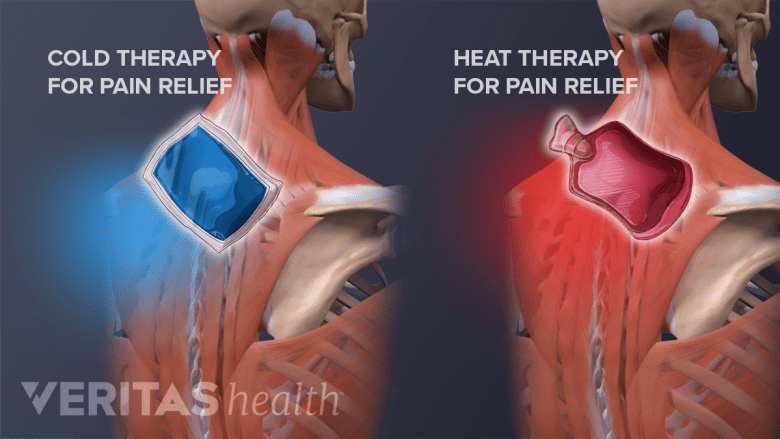Intercostal muscle strain can be a painful experience, but there are various treatment options available to alleviate discomfort and promote healing.
In This Article:
Treatment Options for Intercostal Muscle Strain
While muscles are healing, it can be helpful to alleviate upper back pain and other symptoms using:
Cold and heat therapy
Cold packs reduce inflammation, while heat packs relax muscles and improve circulation.
For the first 48 hours of pain, icing the affected area with an ice pack or cold pack is recommended to reduce inflammation and alleviate pain. After this period, heat therapy can help reduce muscle tension and increase the circulation of blood and nutrients to the injured muscles, aiding the body’s natural healing process. Common heat applications include an adhesive heat wrap, a heating pad, or a warm bath.
Over-the-counter pain medications
NSAIDs reduce inflammation and alleviate back pain with their anti-inflammatory effects.
Anti-inflammatory medications (such as ibuprofen, aspirin, and naproxen) can help reduce painful inflammation in injured muscles. Additionally, pain relievers (such as acetaminophen) can interfere with pain signals sent to the brain and minimize overall pain levels.
- Muscle relaxants. For severe pain, muscle relaxants may be used to reduce painful muscle tension or spasms. These medications are prescribed by a doctor and typically work as a depressant on the central nervous system to relax the muscles. Muscle relaxants are usually used for short-term, acute pain.
See Common Uses for Treating Back and Neck Pain with Muscle Relaxers
- Brief rest period/activity modification. Avoiding strenuous activity, especially an activity that caused or contributed to the muscle injury, is recommended. An extended rest period lasting longer than a few days is generally not advised, as underusing the muscles can lead to weakness and heighten the risk of further injury.
Most cases of intercostal muscle strain can heal using only initial treatments, such as those listed above, within a few days to 8 weeks. Some severe strains may cause upper back pain to last longer; the healing period is largely reliant on the severity of the strain and the effectiveness of treatment.
Stretches for Intercostal Muscle Strain
Gentle physical therapy may be advised to stretch tender muscles after an intercostal muscle injury. Depending on the severity of the injury, exercises may include:
- Breathing exercises, which slowly fill the lungs with air to expand the chest and work the intercostal muscles. To do this exercise, it is typically recommended to sit or stand with the back straight, then take a full breath from the bottom of the lungs. It can help to think of breathing from the diaphragm, by slowly expanding the abdominal muscles while inhaling, then pushing air from the lungs using these same muscles. Repeat breathing stretches 5 to 10 times.
- Gate pose, a common yoga position that stretches the intercostals at the side of the torso. On comfortable padding, rise up on both knees and extend the right leg straight to the side, with the kneecap facing up and the sole on the ground as much as possible. Extend both arms to the sides. Then, bend the upper body toward the right, so the right arm rests on the extended leg. Continue to reach the left arm overhead so a stretch is felt in the left ribs. Hold the stretch between 15 and 30 seconds, then repeat on the left side.
- Forward stretch, used to stretch the intercostals toward the back of the torso. Sit on the floor with the left leg straight in front of the body and the right bent so the sole of the foot touches the knee. Then, lean forward as far as is comfortable over the right leg, rotating the torso slightly and touching both palms to the floor, if possible. A stretch should be felt in the back intercostal muscles on the left side. Hold the stretch for 15 to 30 seconds, then repeat on the opposite side.
- A somewhat advanced extension of this stretch involves twisting to place the left hand on the right (bent) knee, bringing the right arm over the head and bending the torso as far as possible over the left (straight) leg. This position produces a stretch in the back right intercostals. Hold the stretch for 15 to 30 seconds, then repeat on the left.
See 5 Exercises for Upper and Middle Back Pain
Always use caution when stretching—never push to stretch beyond what feels comfortable, as doing so may exacerbate a muscle injury. Stretching for longer than 30 seconds is not advised; studies have shown that stretching beyond 15 and 30 seconds is unlikely to elongate the muscle further.1Page P. Current Concepts in Muscle Stretching for Exercise and Rehabilitation. International Journal of Sports Physical Therapy. 2012;7(1):109-119.
What to Avoid With Intercostal Muscle Strain
Some activities can interfere with the body’s natural healing processes and potentially lead to a longer, more painful recovery, such as smoking and compression wrapping.
It may already be challenging and painful to take deep breaths when the intercostal muscles are injured, so it is recommended to stop smoking to prevent any additional problems with respiration while the muscles heal. Avoiding secondhand smoke as much as possible is also advised.
Additionally, while compression wrapping strained muscles may be advised for some injuries, it is usually not advised for intercostal strains. Wrapping the chest can make breathing more difficult and may cause or worsen bruising in the injured muscles.
- 1 Page P. Current Concepts in Muscle Stretching for Exercise and Rehabilitation. International Journal of Sports Physical Therapy. 2012;7(1):109-119.






